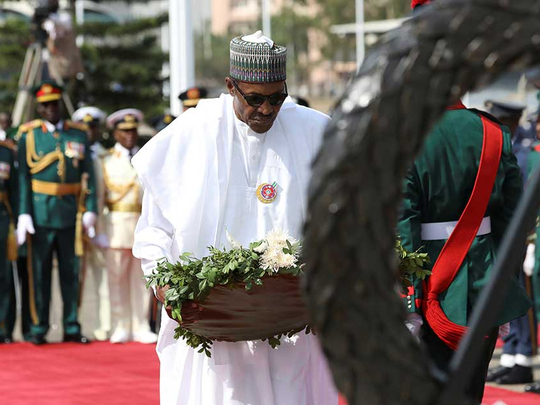
Abuja: Already grappling with Islamist militants in the northeast, secessionists in the east and unrest in the oil-rich Niger River delta, Nigerian President Mohammadu Buhari is facing an upsurge in violence between crop farmers and herders that may threaten his party’s election chances next year.
Images of bodies hacked with machetes and perforated by bullets shared on social media are galvanising voices against Buhari. More than 120 people were killed in Benue and the neighbouring states of Taraba and Adamawa in the first 10 days of this year, according to the National Emergency Management Agency.
“The herdsmen-farmers conflict will be one of the issues that will define the 2019 elections — a litmus test of the performance of this administration,” said Idayat Hassan, executive director of the Abuja-based Centre for Democracy and Development. People “will say he wasn’t able to properly deal with the issue of security in the country.”
The main theatre of the violence is the so-called Middle Belt region, which was one of two key areas whose support helped Buhari’s All Progressives Congress win the March 2015 general elections, marking the first time in Nigeria that the opposition has taken power peacefully. While Buhari, a 75-year-old former military leader, hasn’t said if he will seek re-election, the region could be critical to the chances of his party winning.
Quick action
Buhari has drawn sharp criticism for his alleged failure to take quick action to dampen the conflict. Some opponents say that’s because, like most of the herders in the region, he’s a cattle-owning ethnic Fulani — a charge of favouritism the presidency rejects.
“All the perpetrators of violence in the state will be made to face the wrath of the law,” Buhari said in a statement Monday after meeting with officials from Benue to discuss the crisis. The army earlier sent special forces to the three states.
While the tit-for-tat violence between mainly Christian farmers and predominantly Muslim herders has marred the region for generations, some analysts say it’s worsening because of the proliferation of weapons and the southward advance of the Sahara desert that’s intensifying competition for land and water.
Medium-Scale Wars
“What is striking is that these are not the normal communal conflicts of yesteryears,” said Chris Ngwodo, a political analyst in Jos in the nearby state of Plateau. “These are basically medium-scale military wars.”
The Benue state government has accused Fulani herdsmen of responsibility for a recent spate of killings of farmers to protest a November 1 anti-open grazing law passed in the central farming state. Yet the Miyetti Allah Cattle Breeders Association of Nigeria says more than 1,000 Fulanis were killed and 2 million cattle lost in the conflict since June last year.
“The current situation, in our opinion, is fuelled by the draconian laws put in place by some state governments with the singular aim of chasing our people out of the states for ethnic hatred,” the association’s secretary-general, Baba Usman Ngeljarma, told reporters Sunday.
The perception that the perpetrators won’t face prosecution is fuelling the anger, according to Osai Ojigho, director of Amnesty International Nigeria.
“No one has ever been held to account for the many murders committed during these clashes,” she said in a January 9 statement. “The pattern of reprisals is reaching a boiling point because of the failure of authorities to carry out investigations and end the rampant impunity for previous crimes.”
Unless the government takes action soon, there will probably be a resurgence of civilian militia groups after they were reduced following a disarmament program, Ngwodo said. Residents have also taken up arms in the northeast to defend themselves against Islamist militants.
“On the ground, the federal government is fast losing its legitimacy, fast losing its claim to impartiality,” he said.
The violence is hurting the chances of Buhari’s APC returning to power in 2019, according to Ier Jonathan-Ichaver, who founded Sesor, a non-profit group that aids Nigerians who have been displaced from their homes. Three years ago many analysts were surprised that Benue, a state that had historically supported the ruling party led at the time by President Goodluck Jonathan, swung to Buhari.
“At the time it was anything but Jonathan,” she said by phone from Benue’s main city of Makurdi. “It’s now gotten to a point where it’s anything but Buhari.”












